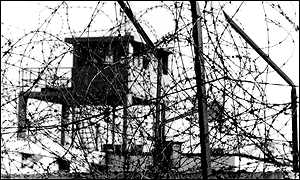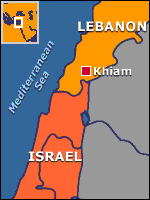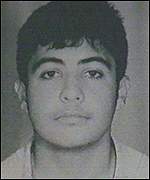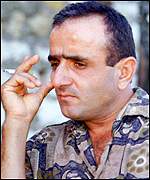Israel accused
BBC News, "Correspondent", November
3, 2000
Winner of the Amnesty International Award 2001

This programme was first broadcast on Saturday 4th November 2000. The feature below accompanied the original broadcast.
Khiam prison was a detention and interrogation centre
during the years of the Israeli occupation in Southern Lebanon. From
1985 until the Israeli withdrawal this May, thousands of Lebanese
were held in Khiam without trial. Most of them were brutally
tortured - some of them died.
Israel has always sought to escape responsibility for what was done
in Khiam; Israel Accused asks where the blame for what Amnesty
International calls "war crimes" really lies.

To help secure its hold on Southern Lebanon, Israel armed and
financed a local Lebanese militia, the South Lebanon Army or SLA. In
theory the SLA was there to protect the interests of the Lebanese
community - in practice it did Israel's work by proxy. The SLA
provided Khiam's guards and interrogators.
Children tortured

Ali two weeks before he
was taken to Khiam
Ali Kashmar was 14 when arrested and detained in 1988. Although he
had voiced anti-Israeli opinions in school (his own father was
killed fighting the Israeli invasion ten years earlier) there is no
evidence to suggest that he was guilty of any crime.
Ali was tortured for 11 days and says he started making up stories
to please his interrogators. Ali Kashmar was kept in Khiam for ten
years. He grew up from a boy to a man within the prison walls -
without even a mirror to use as his appearance changed, and spent
time in solitary confinement. Ali was eventually released after a
decade as part of a hostage exchange - 55 Khiam prisoners and the
bodies of 44 Lebanese were traded for the remains of three Israeli
soliders in 1998. Terribly damaged by his years in Khiam, he is
still fighting severe psychological difficulties - and there is
nowhere in Lebanon that provides treatment for this kind of trauma.
Ryadh Kalakesh was 17 when he was detained in Khiam. He comes from a
family that was deeply involved with the Islamic group Hezbollah -
one of his brothers was a suicide bomber - and he was picked up by
Israeli troops on a sweep through his village in 1986.
Ryadh was tortured for 11 months, and gives a graphic account of
what it was like; the use of electric shocks administered through
wires attached to the finger tips or the genitals, the beatings, the
dousings with hot then cold water, and what was known as "the pole",
where prisoners - often after being striped naked - were handcuffed
and suspended for hours at a time.
Ryadh's brother Adel was detained in Khiam too; when Adel refused to
tell the interrogators what they wanted to hear they hauled in his
wife Mona and tortured her so that he could hear her screams. Mona
suffered electric shocks - through wires attached to her nipples -
spent three months in solitary confinement and lost her baby while
she was in the prison.
Khiam prison today
There is a compelling body of evidence about Israel's involvement in
Khiam. Former detainees all say that in the early days of Khiam's
time as a detention centre Israeli interrogators worked alongside
their SLA counterparts, and their evidence is corroborated by that
of those guards who worked in the prison.
In 1988 the Israelis seem to have decided on a change of policy in
Khiam, and the Israeli presence in the gaol became less obvious. But
in a court case brought by Israeli human rights lawyers, the Defence
Ministry has admitted paying all the staff at the gaol, training the
interrogators and guards, and providing assistance with lie detector
tests.
Israel denied war crimes in Khiam

Tanious Nafra, a guard
in Khiam 1985-1987
In May, when Israel withdrew from Lebanon, many of Khiam's guards
and interrogators fled across the border among the 6000 members of
the SLA and their families who took refuge in Israel, living under
Israeli government protection at the expense of the Israeli
taxpayer.
No one from the Israeli government was willing to agree to an
interview. When pressed to admit Israeli responsibility for the
gaol, a man who commanded Israeli forces during the late 1980s
finally concedes, "maybe".
Broadcast in the midst of one of the gravest Middle East crises of
the past decade, Israel Accused is a timely reminder that there is
still unfinished business from Israel's recent past.
This week, military prosecutor, Riad Talih demanded the death
penalty for 11 former SLA officials who worked at the Khiam camp,
and who will be tried in absentia.
Reporter: Edward Stourton
Producer: Giselle Portenier
Series Producer: Farah Durrani
Editor: Fiona Murch
"When a Jew, in America or in South Africa, talks to
his Jewish companions about 'our' government, he means the
government of Israel."
- David Ben-Gurion, Israeli Prime Minister

Viva Palestina!
Latest Additions
- in English
What is this Jewish
carnage
really about? - The background to
atrocities
Videos on Farrakhan, the Nation of Islam and Blacks and Jews

How Jewish Films and Television Promotes bias Against
Muslims
Judaism is Nobody's
Friend
Judaism is the Jews' strategy to
dominate non-Jews.
Jewish War Against
Lebanon!
Islam and Revolution
By Ahmed Rami
Hasbara -
The Jewish manual
for media deceptions
Celebrities bowing to their Jewish masters

Elie Wiesel - A Prominent False Witness
By Robert Faurisson
The Gaza atrocity 2008-2009

Iraq - war and occupation
Jewish War On
Syria!
CNN's Jewish version of "diversity"
- Lists the main Jewish agents
Hezbollah the Beautiful
Americans, where is your own Hezbollah?
Black Muslim leader Louis Farrakhan's Epic Speech in Madison Square
Garden, New York
 - A must see!
- A must see!
"War on Terror" -
on Israel's behalf!
World Jewish Congress: Billionaires, Oligarchs, Global Influencers for Israel
Interview with anti-Zionist veteran Ahmed Rami of Radio Islam
- On ISIS, "Neo-Nazis", Syria, Judaism, Islam, Russia...
Britain under Jewish
occupation!

Jewish World Power
West Europe
East Europe
Americas
Asia
Middle East
Africa
U.N.
E.U.
The Internet and
Israeli-Jewish infiltration/manipulations
Books
- Important collection of titles
The Judaization of
China
Israel: Jewish Supremacy in Action
- By David Duke
The Power of Jews in France
Jew Goldstone appointed by UN to investigate War Crimes in Gaza

The best book on Jewish Power
The Israel Lobby
- From the book
Jews and Crime - The archive
Sayanim - Israel's and Mossad's Jewish helpers abroad
Listen to Louis Farrakhan's Speech
- A must hear!
The Israeli Nuclear Threat
The "Six
Million" Myth
"Jewish History"
- a bookreview
Putin and the
Jews of Russia
Israel's attack on US warship USS Liberty
- Massacre in the Mediterranean
Jewish "Religion" - What is
it?
Medias
in the hands of racists
Strauss-Kahn - IMF chief and member of Israel lobby group

Stop Jewish Apartheid!
The Jews behind Islamophobia
Israel controls U.S. Presidents
Biden, Trump, Obama, Bush, Clinton...
The Victories of Revisionism
By Professor Robert Faurisson
The Jewish hand behind Internet
The Jews behind Google, Facebook, Wikipedia,
Yahoo!, MySpace, eBay...
"Jews, who want to be decent human beings, have to renounce being Jewish"
Jewish War Against Iran
Jewish Manipulation of World Leaders

Al Jazeera English under
Jewish infiltration

Garaudy's "The Founding
Myths
of Israeli Politics"
Jewish hate against Christians
By Prof. Israel Shahak
Introduction to Revisionist
Thought
- By Ernst Zündel
Karl Marx: The Jewish Question
Reel Bad Arabs
- Revealing the racist Jewish Hollywood propaganda
"Anti-Semitism" - What is it?
Videos
 - Important collection
- Important collection
The Jews Banished 47 Times in 1000 Years - Why?
Zionist
strategies
- Plotting invasions, formenting civil wars, interreligious strife,
stoking racial hatreds and race war
The International Jew
By Henry Ford
Pravda interviews Ahmed Rami

Shahak's
"Jewish History,
Jewish Religion"
The Jewish plan to destroy the Arab countries
- From the World Zionist Organization
Judaism and Zionism inseparable
Revealing photos of the Jews 
Horrors of ISIS Created by Zionist Supremacy
- By David Duke
Racist Jewish Fundamentalism
The Freedom Fighters:
 Hezbollah
- Lebanon
Hezbollah
- Lebanon
 Nation of Islam
- U.S.A.
Nation of Islam
- U.S.A.
Jewish Influence in America

- Government, Media, Finance...
"Jews" from
Khazaria stealing the land of Palestine
The U.S. cost of supporting Israel
Turkey, Ataturk and
the Jews

The truth about the Talmud
Israel and the Ongoing Holocaust in Congo
Jews DO control the media -
a Jew brags!
- Revealing Jewish article
Abbas - The Traitor
Protocols of Zion
- The whole book!

Encyclopedia of the
Palestine Problem
The
"Holocaust" - 120 Questions and Answers
Quotes
- On Jewish Power / Zionism
Caricatures / Cartoons

Activism!
- Join the Fight!






































